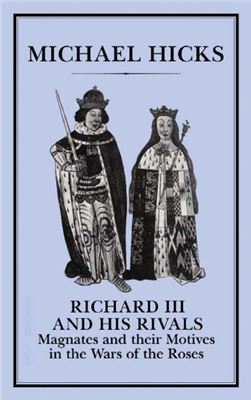London: Hambledon Continuum, 2003. - 462 p.
Richard III is undoubtedly the dominant personality in this collection of essays, but not in his capacity as king of England. Richard was Duke of Gloucester far longer than he was king. For most of his career, he was a subject, not a monarch, the equal of the great nobility. He is seen here in the company of his fellows: Warwick the Kingmaker, Clarence, Northumberland, Somerset, Hastings a the Wydevilles. His relations with these rivals, all of whom submitted to him or were crushed, show him in different moods and from various vantage points.
Contents:
Acknowledgements
ntroduction
Bastard Feudalism: Society and Politics in Fifteenth-Century England
dealism in Late Medieval English Politics
Attainder, Resumption and Coercion, 1461-1529
Chantries, Obits and Almshouses: The Hungerford Foundations, 1325-1478
The Piety of Margaret, Lady Hungerford (d. 1478)
St. Katherine's Hospital, Heytesbury: Prehistory, foundation and Re-foundation, 1409-78
Restraint, Mediation and Private Justice: George, Duke of Clarence as 'Good Lord'
Edward IV, the Duke of Somerset and Lancastrian Loyalism in the North
Piety and Lineage in the Wars of the Roses: The Hungerford Experience
Counting the Cost of War: The Moleyns Ransom and the Hungerford Land-Sales, 1453-87
The Changing Role of the Wydevilles in Yorkist Politics to 1483
Lord Hastings' Indentured Retainers?
Richard III as Duke of Gloucester: A Study in Character
Richard Ill's Cartulary in the British Library MS Cotton Julius BXII
What Might Have Been: George Neville, Duke of Bedford, 1465-83: His Identity and Significance
The Last Days of Elizabeth, Countess of Oxford
Richard III and Romsey
Descent, Partition and Extinction: The Warwick Inheritance
The Beauchamp Trust, 1439-87
The Neville Earldom of Salisbury, 1429-71
Dynastic Change and Northe Society: The Fourth Earl of Northumberland, 1470-89
The Yorkist Rebellion of 1489 Reconsidered
The Case of Sir Thomas Cook, 1468
Richard III is undoubtedly the dominant personality in this collection of essays, but not in his capacity as king of England. Richard was Duke of Gloucester far longer than he was king. For most of his career, he was a subject, not a monarch, the equal of the great nobility. He is seen here in the company of his fellows: Warwick the Kingmaker, Clarence, Northumberland, Somerset, Hastings a the Wydevilles. His relations with these rivals, all of whom submitted to him or were crushed, show him in different moods and from various vantage points.
Contents:
Acknowledgements
ntroduction
Bastard Feudalism: Society and Politics in Fifteenth-Century England
dealism in Late Medieval English Politics
Attainder, Resumption and Coercion, 1461-1529
Chantries, Obits and Almshouses: The Hungerford Foundations, 1325-1478
The Piety of Margaret, Lady Hungerford (d. 1478)
St. Katherine's Hospital, Heytesbury: Prehistory, foundation and Re-foundation, 1409-78
Restraint, Mediation and Private Justice: George, Duke of Clarence as 'Good Lord'
Edward IV, the Duke of Somerset and Lancastrian Loyalism in the North
Piety and Lineage in the Wars of the Roses: The Hungerford Experience
Counting the Cost of War: The Moleyns Ransom and the Hungerford Land-Sales, 1453-87
The Changing Role of the Wydevilles in Yorkist Politics to 1483
Lord Hastings' Indentured Retainers?
Richard III as Duke of Gloucester: A Study in Character
Richard Ill's Cartulary in the British Library MS Cotton Julius BXII
What Might Have Been: George Neville, Duke of Bedford, 1465-83: His Identity and Significance
The Last Days of Elizabeth, Countess of Oxford
Richard III and Romsey
Descent, Partition and Extinction: The Warwick Inheritance
The Beauchamp Trust, 1439-87
The Neville Earldom of Salisbury, 1429-71
Dynastic Change and Northe Society: The Fourth Earl of Northumberland, 1470-89
The Yorkist Rebellion of 1489 Reconsidered
The Case of Sir Thomas Cook, 1468

